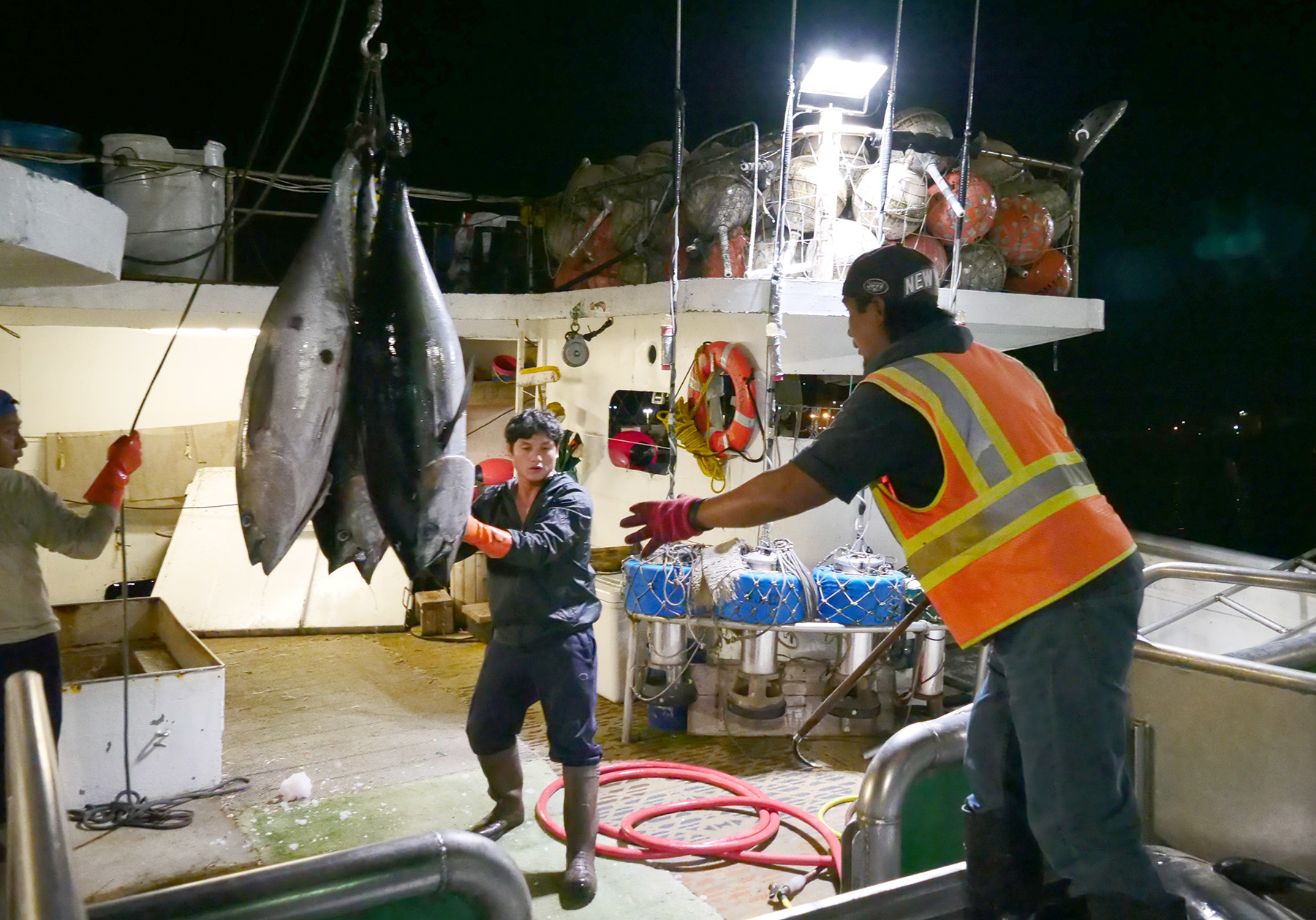State Supreme Court: Hawaii Longline Industry’s Use Of Foreign Crews OK
Those crews’ working conditions have come under scrutiny in recent years because they don’t have legal standing in the U.S. and can’t leave the pier when docked.
A new Hawaii Supreme Court decision upholds the local longline fleet鈥檚 reliance on some 700 foreign fishermen who can鈥檛 legally leave the dock when their boats arrive in Honolulu Harbor.
Specifically, the opinion, released Thursday, ruled that it鈥檚 OK for state officials to grant commercial licenses to those fishermen confined to the pier, even though they have no legal status in the U.S.
It鈥檚 permissible, the court said, because Hawaii鈥檚 fleet of 140 or so longline vessels fish for ahi and other fresh seafood only in the deep ocean — not in the state-designated waters closer to shore.
The fleet鈥檚 catch has been valued at more than $100 million annually.

Malama Chun, a Native Hawaiian waterman from Maui, has been challenging the longliners鈥� business model before the state’s land board and its courts since 2017. He and others argue that the unusual practice leaves those fishermen, who mostly hail from Indonesia, the Philippines, Vietnam and Kiribati, vulnerable to labor abuses.
Chun鈥檚 lawyer, , acknowledged Monday that the court鈥檚 decision wasn鈥檛 the 鈥渂ig win鈥� they had sought to upend the longliner practices. However, the legal battle did help spur some changes to the fishermens’ situation, he added.
Last year, state leaders passed into law , which lifted the requirement for each fisherman aboard a vessel to have a commercial license in order to sell their catch. Now, just one license is required per vessel, covering everyone aboard.
The new law further requires that the longline vessel operators file reports with detailed information on each of the crew members aboard. Collins said that will help curtail potential human trafficking within the industry 鈥� and that Chun鈥檚 legal challenge helped make it possible.
鈥淲e think that 鈥� it has curbed the extreme excesses of the exploitative labor processes,鈥� Collins said. The results of Chun鈥檚 legal challenge are not a 鈥渃ure all,鈥� but they鈥檙e a 鈥渟mall step toward righting the ship,鈥� he added.
Meanwhile, the Hawaii Longline Association said it was pleased with the Supreme Court opinion.
鈥淭his is the third time this question has been reviewed legally, and in all three occasions HLA and the state of Hawaii has prevailed,鈥� said , the association鈥檚 executive director.

鈥淚t鈥檚 pretty cut-and-dry that the state has been issuing these licenses properly and legally,鈥� Kingma added.
An in 2016 found that many of those fishermen live in terrible conditions. Following the scrutiny from that report, the HLA developed a crew handbook and code of conduct for decent work aboard the Hawaii-based longline vessels, and a standardized crew contract across the fleet, among other measures to help address the concerns, Kingma said.
The industry also developed a 鈥渃rew grievance committee,鈥� composed of vessel owners, community liaisons and local groups that interact with the foreign fishermen, and other parties, that meets quarterly to discuss any employment issues that arise, Kingma said.
In the three years or so since that committee formed, there have only been relatively minor issues, such as disputes over payment or conflict with managers, Kingma said. He added that he鈥檚 not aware of any human trafficking incidents within the fleet.
Local longliners have been employing the foreign workers for the past 30 years, according to Kingma. Those crews typically sign contracts for a year or longer to work on the fishing boats. The HLA would prefer if those fishermen could get visas to enter the U.S., but that would require action from Congress that remains highly unlikely, he added.
鈥淭his is a tough job. It鈥檚 a dangerous job. But it鈥檚 also one that鈥檚 in high demand for these foreign workers for the compensation they receive,鈥� Kingma said.
Nonetheless, a by the found that the steps taken by the industry to address labor concerns were 鈥渋nsufficient to address the vulnerabilities identified in the AP reports.鈥�
鈥淔ishermen continue to face harsh working conditions,鈥� the Georgetown report stated, after its authors spoke with more than 40 foreign crew members docked at piers 17, 36 and 38 in the harbor. 鈥淢ultiple sources commented on the fact that employers fail to provide fishermen with basic necessities 鈥� including adequate food, water, medical care, clothes, toiletries, and even safety gear.鈥�
Read the Supreme Court’s opinion here:
 Sign up for our FREE morning newsletter and face each day more informed.
Sign up for our FREE morning newsletter and face each day more informed.
We need your help.
Unfortunately, being named a聽finalist for a聽Pulitzer prize聽doesn’t make us immune to financial pressures. The fact is,聽our revenue hasn鈥檛 kept pace with our need to grow,听.
Civil Beat is a nonprofit, reader-supported newsroom based in 贬补飞补颈驶颈. We鈥檙e looking to build a more resilient, diverse and deeply impactful media landscape, and聽we hope you鈥檒l help by .
About the Author
-

Marcel Honor茅 is a reporter for Civil Beat. You can email him at mhonore@civilbeat.org

